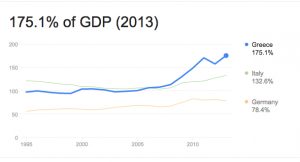Greece and the European Union
Greece’s Debacle
A friend sends James K. Galbraith‘s thoughtful article, “From the Destruction of Greece to Democracy in Europe” (Boston Globe, 22 August):
Last year’s third bailout of Greece, imposed by Europe and the International Monetary Fund, does to Greece what Versailles did to Germany. It strips assets to satisfy debts….a quagmire of graft to support an illusion that Greece could “compete” as part of the euro. Already in 2010 the IMF knew it was breaking its own rules by pretending that Greece could recover quickly, sustain a huge primary surplus, and repay its debts….
Europe crushed the Greek resistance in 2015. Not because Wolfgang Schäuble, the German finance minister, thought his economic plan would work; he candidly told the Greek finance minister, Yanis Varoufakis, that “as a patriot” he would not sign it himself. But Germany wants to impose its order on Italy and on France, where civil society continues to fight back….Greece was given collective punishment as a lesson. It was done to show that “there is no alternative.” It was done to stop any other attempt to develop, articulate, and defend a more rational policy. It was done to protect the power of the European Central Bank, the German government in Europe, and the policy-making authority, in face of a long record of failure, of the IMF. Greece is now a colony — the polite say “protectorate.”
The Downward Spiral
My friend describes this as “a slam-dunk on the European Union that exceeds anything Nigel Farage said.” (Farage is the UK Independence Party leader who helped win the Brexit vote on June 23rd.)
Galbraith praises Varoufakis’s Democracy in Europe Movement (DiEM25)—which sounds oddly like Farage’s Europe of Freedom and Direct Democracy Group (EFDD), but isn’t. It is supposedly “a transnational European progressive movement” that restores national voter control within the EU. But as the author seems to admit, DiEM25 has as much a chance as Bernie Sanders’ “Our Revolution.” The EU is not salvageable.
We think of Greece as the historic cradle of liberty. Once prosperous, her throat was cut by the socialists who stayed in power by dispensing ever greater largesse, and through the superstate they invented, the European Union.
Greece joined the EU in 1981, and adopted the euro in 2001. She was in time to be among the first wave of countries to launch euro banknotes and coins on 1 January 2002. Amid the more or less free-trade community and during 1980s prosperity, Greece did very well for herself; in the 1990s, somewhat worse; after adopting the euro, dismally:

Churchill’s Hopes?
A colleague who read all this asked: “Would Churchill’s goals for peace in Europe be achieved if everyone left the EU except Germany and France? My understanding is that he was motivated not by a single European state. He meant to eliminate seventy-five years of animosity and war between those two powers.”
It is not possible to conflate Churchill’s time with ours in that way. He certainly did not believe that the path forward after World War II lay in a federal union. He said so plainly enough. (See “Churchill’s View” here.) The ideas of sovereignty, democracy and free trade—which Churchill espoused—are evergreen. Open borders, a European army, and unelected bureaucrats writing the laws of nations are not.
But the Greek debacle is nothing compared to what’s coming in Italy and Spain. I fear the world is in for upheavals that may prove impossible to handle by the current crop of platitudinous, principle-less, self-enriching, politically correct national leaders. And then what? Who knows? Those of us who will be dead may relax. As for the rest of you, good luck.







